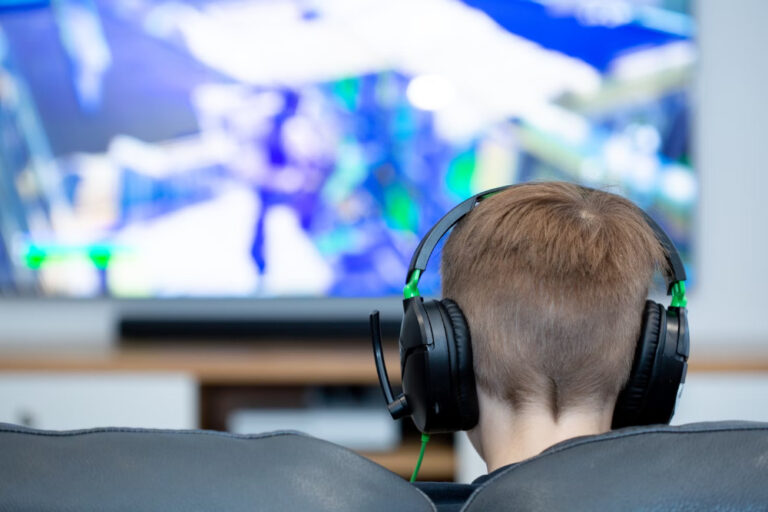
Does your teenager seem permanently attached to their smartphone, their eyes constantly darting to the screen, fingers flying across the keyboard? In an age where smartphones are central to social lives, learning, and entertainment, it can be incredibly challenging for parents to distinguish between normal adolescent tech use and a genuine problem. If you’re worried that your child’s relationship with their device has crossed a line, understanding Teen Smartphone Addiction: How to Identify the Symptoms is your crucial first step.
Many parents grapple with this concern: “Is my teen just being a teen, or is this something more serious?” You might observe them becoming agitated when separated from their phone, their schoolwork suffering, or their real-world interactions dwindling.
This guide is designed to help you navigate these murky waters by providing a clear understanding of what teen smartphone addiction looks like, focusing specifically on the behavioral, emotional, physical, and academic symptoms that can signal a developing or established dependency.

The Double-Edged Device: Smartphones in Your Teen’s World
Before we dive into the symptoms of teen smartphone addiction, it’s vital to acknowledge the complex role smartphones play in modern adolescence. For today’s teens—true digital natives—smartphones are not just gadgets; they are primary tools for communication, social connection, learning, self-expression, and entertainment. They use them to chat with friends, collaborate on school projects, access information, watch videos, listen to music, play games, and participate in online communities.
In many ways, these devices have become extensions of their social lives. FOMO (Fear Of Missing Out) is a powerful driver, as teens want to stay updated on what their peers are doing and saying.
Social media platforms like Instagram, TikTok, Snapchat, and Discord are hubs for teen interaction. Denying access or severely restricting use without understanding this context can feel like social isolation to a teenager. Remember what it was like to wait by the landline for a call? For them, that constant connection is always in their pocket.
However, this constant connectivity and the highly engaging nature of smartphone apps and content also make teens particularly vulnerable. Their brains are still developing, especially the prefrontal cortex responsible for impulse control, decision-making, and moderating social behavior.
This developmental stage, combined with the dopamine-driven reward loops built into many apps, can create a perfect storm for problematic use, potentially escalating into what we recognize as teen smartphone addiction. The challenge for parents is to support the positive uses of technology while vigilantly watching for signs that it’s becoming detrimental.
Beyond Typical Teen Tech Use: Defining Teen Smartphone Addiction
So, what separates typical, albeit sometimes extensive, teen smartphone use from a genuine teen smartphone addiction? While not yet a formal standalone diagnosis in major psychiatric manuals like the DSM-5 (though “Internet Gaming Disorder” is noted for further study), the concept of behavioral addiction is widely accepted, and smartphone overuse can fit this model.
Teen smartphone addiction can be defined as a compulsive pattern of smartphone use that an adolescent finds difficult to control, despite negative consequences in various aspects of their life. It’s more than just the number of hours spent on the phone; it’s about the loss of control and the adverse impact on their well-being and functioning.
Key characteristics include:
- Compulsion: An overwhelming urge or craving to use the smartphone, often for specific apps or activities.
- Loss of Control: Inability to limit usage, stick to self-imposed rules, or cut back despite wanting to.
- Continued Use Despite Harm: Persisting with heavy smartphone use even when it’s clearly causing problems (e.g., failing grades, sleep deprivation, family conflict, health issues).
- Withdrawal Symptoms: Experiencing negative emotional or physical reactions when unable to use the phone or when use is restricted (e.g., irritability, anxiety, restlessness).
- Preoccupation: The smartphone and online activities dominate their thoughts, even when they are supposed to be focused on other things.
It’s crucial for parents to understand that many teens will exhibit some of these behaviors occasionally without being addicted. For instance, being engrossed in a new game or chatting excitedly with friends is normal. However, when these behaviors become persistent, severe, and lead to functional impairment across multiple life domains, it’s time to consider the possibility of teen smartphone addiction. The line is crossed when the phone stops being a tool and starts dictating their life. Is the phone serving your teen, or is your teen serving the phone?
Unmasking the Problem: How to Identify the Symptoms of Teen Smartphone Addiction
Identifying the symptoms of teen smartphone addiction requires careful observation and understanding that these signs often manifest across different areas of a teen’s life. It’s rarely just one symptom, but a cluster of changes in behavior, mood, physical health, and academic/social functioning.
Here’s a detailed breakdown of what to look for:
Behavioral Symptoms: The Outward Signs
These are often the most noticeable changes in your teen’s day-to-day actions:
- Excessive Use: Spending significantly more time on their smartphone than intended, often for many hours a day, and being unable to reduce this time despite attempts.
- Loss of Control over Use: Repeatedly failing to stick to self-imposed or parent-set limits on phone use. “Just five more minutes” turns into hours.
- Sneaking or Hiding Phone Use: Being secretive about their phone habits, using it late at night when they should be sleeping, or lying about the amount of time they spend on it.
- Constant Need for the Phone: Having the phone on or near them at all times, even in inappropriate situations (e.g., at the dinner table, in the bathroom, during family events). They may panic if they misplace it.
- Neglecting Responsibilities: Failing to complete homework, chores, or other obligations due to preoccupation with their smartphone.
- “Phubbing” (Phone Snubbing): Ignoring people they are physically with in favor of their phone, leading to frustration in face-to-face interactions.
- Risky Use: Using their smartphone in dangerous situations, such as while crossing the street, biking, or even driving (for older teens).
- Chasing “Likes” or Validation: An obsessive need to check for notifications, likes, comments, or messages, with their mood visibly affected by this online validation (or lack thereof).
Emotional Symptoms: The Internal Turmoil
These symptoms reflect the teen’s mood and emotional regulation, which can be significantly impacted by teen smartphone addiction:
- Irritability and Agitation: Becoming easily angered, frustrated, or anxious when they cannot use their phone, when their internet connection is slow, or when asked to put the phone away.
- Restlessness and Anxiety: Feeling on edge or unable to relax without their phone; displaying symptoms of nomophobia (NO MObile PHOne phoBIA).
- Depressed Mood or Sadness: Increased feelings of loneliness, hopelessness, or depression, which can be both a cause and a consequence of excessive phone use. Social comparison on platforms like Instagram can exacerbate these feelings.
- Mood Swings: Rapid shifts in mood that seem tied to their online experiences or ability to access their phone.
- Difficulty Concentrating: Struggling to focus on tasks that don’t involve their phone, such as reading a book, homework, or conversations.
- Exaggerated Emotional Responses to Online Events: Becoming overly upset by online drama, cyberbullying, or negative comments.
Physical Symptoms: The Toll on the Body
Excessive smartphone use can also manifest in physical ways:
- Sleep Deprivation/Changes in Sleep Patterns: Staying up late to use their phone, difficulty falling asleep due to blue light exposure, or waking up to check their phone. This often leads to daytime fatigue.
- Eye Strain: Complaining of dry, itchy, or tired eyes, blurred vision, or headaches after prolonged screen use.
- Neck and Back Pain (“Tech Neck”): Resulting from poor posture while hunching over their phone for extended periods.
- Carpal Tunnel Syndrome or “Text Claw”: Pain, numbness, or tingling in the hands and wrists from repetitive motions like texting or scrolling.
- Changes in Weight or Eating Habits: Mindless snacking while using the phone, or skipping meals to continue online activities, potentially leading to weight gain or poor nutrition.
- Neglect of Personal Hygiene: In severe cases, a teen might neglect basic hygiene like showering or brushing teeth because they are so engrossed in their phone.
Social & Academic Symptoms: Impact on Their World
The addiction often spills over into their performance and interactions:
- Decline in Academic Performance: Dropping grades, missed assignments, difficulty concentrating in class, or receiving negative feedback from teachers.
- Withdrawal from Real-Life Social Activities: Losing interest in hobbies, sports, clubs, or spending time with friends and family offline. They may prefer virtual interactions.
- Strained Family Relationships: Increased arguments with family members, usually centered around phone use, leading to a tense home environment.
- Difficulties in Face-to-Face Communication: Struggling with eye contact, engaging in reciprocal conversation, or picking up on social cues offline.
- Increased Secrecy and Isolation: Spending more time alone in their room with their phone, and becoming defensive or evasive when asked about their online activities.
If you recognize a consistent pattern of these symptoms in your teenager, it’s a strong indication that their smartphone use has become problematic and may warrant a deeper look into teen smartphone addiction. A helpful tool could be a simple checklist (see below for an example).
Why Are Teens So Vulnerable? Understanding the Pull of the Smartphone
Understanding why teenagers are particularly susceptible to teen smartphone addiction can help parents approach the issue with more empathy and effectiveness. Several developmental, psychological, and social factors converge during adolescence:
- Brain Development: The teenage brain is still a work in progress. The prefrontal cortex, responsible for executive functions like impulse control, planning, and risk assessment, isn’t fully mature until the mid-twenties. This makes teens more prone to impulsive behaviors and less equipped to resist the instant gratification offered by smartphones.
- Dopamine Reward System: Smartphones and social media apps are designed to trigger the release of dopamine, a neurotransmitter associated with pleasure and reward. Likes, notifications, new messages, and achieving goals in games all provide small dopamine hits, creating a compulsion loop that encourages repeated engagement. Teens, with their heightened sensitivity to rewards, can get easily caught in this cycle.
- Social Connection and Peer Validation: Adolescence is a period where peer relationships and social acceptance are paramount. Smartphones are the primary conduits for teen social life. FOMO (Fear Of Missing Out) is intense. They feel a strong need to be constantly connected, updated, and validated by their peers online. Not being on their phone can feel like being excluded from their entire social world.
- Identity Formation: Teens use online platforms to explore and express their identities. They create profiles, share content, and interact with others as they figure out who they are. This experimentation, while normal, can become enmeshed with their phone use.
- Escape and Coping Mechanism: Adolescence can be a stressful time, filled with academic pressure, social anxieties, and emotional ups and downs. Some teens turn to their smartphones as an escape from these pressures or as a way to cope with uncomfortable feelings like boredom, loneliness, or anxiety. This can become a maladaptive coping strategy.
- Accessibility and “Always-On” Culture: Smartphones are always available, providing a constant portal to endless content and interaction. Unlike past generations where access to specific media was limited, today’s teens live in an “always-on” digital environment, making it harder to disconnect.
Recognizing these vulnerabilities isn’t about excusing problematic behavior, but about understanding the powerful forces at play when a teen develops an unhealthy attachment to their smartphone. This understanding can inform a more compassionate and effective approach to addressing teen smartphone addiction.
The Ripple Effect: Consequences of Unchecked Smartphone Use in Adolescence
When teen smartphone addiction takes hold, its effects are not confined to just the individual teen; they create ripples that impact their overall development, well-being, and future prospects. Ignoring these symptoms can lead to significant long-term consequences.
Academic Future at Risk:
One of the most immediate and tangible consequences is a decline in academic performance. Constant distractions from notifications, late-night phone use leading to sleep deprivation, and reduced time for homework and studying can result in:
- Lower grades and test scores.
- Difficulty concentrating in class and retaining information.
- Increased absenteeism or tardiness.
- Reduced chances of getting into desired colleges or pursuing certain career paths.
- Is their phone screen dimming their bright future?
Mental and Emotional Health Decline:
The link between excessive smartphone use and negative mental health outcomes in teens is a growing concern:
- Increased risk of anxiety and depression: Social comparison, cyberbullying, FOMO, and the pressure to maintain a perfect online persona can take a heavy toll.
- Lowered self-esteem and body image issues: Constantly viewing curated, often unrealistic, images of peers and influencers can lead to feelings of inadequacy.
- Impaired emotional regulation: Over-reliance on the phone as a coping mechanism can hinder the development of healthier ways to manage stress and negative emotions.
- Increased feelings of loneliness and isolation: Despite being “connected,” a lack of meaningful face-to-face interaction can exacerbate feelings of being alone.
Compromised Physical Health:
The physical toll, as mentioned in the symptoms, can become chronic if not addressed:
- Persistent sleep disorders.
- Chronic neck/back pain and vision problems.
- Increased risk of obesity due to a sedentary lifestyle and poor eating habits associated with prolonged screen time.
Stunted Social Development:
While smartphones facilitate online social interaction, overuse can hinder crucial aspects of offline social development:
- Difficulty with in-person communication skills, such as reading non-verbal cues, active listening, and engaging in nuanced conversations.
- Reduced ability to form and maintain deep, meaningful offline friendships.
- Potential for becoming a victim or perpetrator of cyberbullying, which can have lasting emotional scars.
Strained Family Relationships:
Teen smartphone addiction often becomes a major source of conflict within families. Constant arguments over phone use, feelings of being ignored by the teen, and the teen’s withdrawal from family activities can create a tense and unhappy home environment.
Understanding these potential ripple effects underscores the importance of early identification of symptoms and timely intervention to help teens navigate the digital world more healthily.
Opening the Conversation: What Parents Can Do (A Brief Overview)
While the primary focus of this article is on identifying the symptoms of teen smartphone addiction, recognizing these signs naturally leads to the question: “What can I do?” Here’s a brief overview of initial steps parents can consider. (A more detailed guide on solutions would be a separate topic).
- Stay Calm and Approach with Empathy: Avoid accusatory language. Start by expressing your concern for their well-being. “I’ve noticed you seem really tired lately, and I’m worried about how much time you’re spending on your phone. Can we talk about it?”
- Educate Yourself and Your Teen: Discuss the potential downsides of excessive phone use and the nature of addictive technology. Many teens are unaware of how these apps are designed to hook them.
- Collaborate on Setting Boundaries: Involve your teen in creating a family media plan. This could include:
- Tech-free times: E.g., during meals, an hour before bed.
- Tech-free zones: E.g., bedrooms at night.
- Agreed-upon daily limits for recreational phone use.
- Encourage Offline Activities and Hobbies: Help them find and pursue interests that don’t involve screens. Support their involvement in sports, arts, clubs, or volunteering.
- Model Healthy Habits: Teens are more likely to adopt healthy tech habits if they see their parents doing the same. Be mindful of your own screen time.
- Utilize Technology Tools: Explore parental control apps that can help manage time and filter content, but use them as a support to open dialogue, not a replacement for it.
- Focus on Sleep: Prioritize healthy sleep hygiene. Ensure phones are not in the bedroom at night.
The goal is to empower your teen to develop self-regulation skills, not to engage in a constant power struggle. [Internal Linking Opportunity: Link to a more comprehensive article on “Strategies to Help Your Teen Overcome Smartphone Addiction.”]
Knowing When to Seek Professional Help (A Brief Overview)
Sometimes, despite your best efforts, a teen’s smartphone use remains problematic and exhibits clear signs of teen smartphone addiction that are beyond your capacity to manage alone.
Consider seeking professional help if:
- Your teen exhibits many of the severe symptoms listed, and these are causing significant impairment in their daily life (school, relationships, health).
- Your attempts to set limits and encourage healthier habits are met with extreme resistance, aggression, or deception.
- You suspect underlying mental health issues such as depression, anxiety, ADHD, or social phobia that might be fueling the phone use or being exacerbated by it.
- The teen expresses an inability to control their use and is distressed by it.
Potential Sources of Help:
- Pediatrician or Family Doctor: Can provide an initial assessment and referrals.
- Child/Adolescent Psychologist or Therapist: Look for professionals experienced in behavioral addictions or teen mental health. Cognitive Behavioral Therapy (CBT) is often effective.
- School Counselor: Can offer support and strategies within the school environment.
- Family Therapy: Can help address communication issues and develop a unified family approach.
Remember, seeking professional help is a sign of proactive parenting, not failure.
Conclusion: Navigating the Digital Maze with Your Teen
The ubiquitous smartphone is a powerful tool that has profoundly shaped the landscape of adolescence. While it offers connection and information, its allure can sometimes lead to teen smartphone addiction, a condition marked by a constellation of behavioral, emotional, physical, and academic symptoms. Recognizing these signs early is paramount for parents wanting to guide their teens toward a healthier, more balanced relationship with technology.
It’s not about demonizing the device, but about fostering mindful use and ensuring that the vibrant world within the screen doesn’t overshadow the richness of life beyond it. By understanding the symptoms, the underlying vulnerabilities, and the potential consequences, you are better equipped to open a constructive dialogue and implement supportive strategies. Your awareness and compassionate action can make all the difference in helping your teen navigate the digital maze successfully.
If you’ve recognized several concerning symptoms in your teen:
- Choose a calm moment this week to gently express your observations and concerns without accusation.
- Download and review a symptom checklist (like the one hinted at earlier) to objectively assess the situation.
- Initiate a family discussion about creating a simple ‘tech-free’ zone or time in your home, starting small.
Your teen’s journey through adolescence in this digital age requires your guidance more than ever. Identifying the signs of smartphone addiction is the first, most critical step towards helping them thrive.
Frequently Asked Questions (FAQ)
Q1: How can I tell if my teen’s phone use is normal for their age or a sign of teen smartphone addiction?
It’s a common parental concern. “Normal” teen phone use involves social connection, entertainment, and schoolwork, but it shouldn’t consistently cause negative consequences. Key differentiators for teen smartphone addiction symptoms include a loss of control over use, neglect of responsibilities (school, chores, hygiene), withdrawal symptoms (irritability, anxiety when without the phone), and continued overuse despite clear harm. If the phone is causing significant distress or impairment in their daily life, it’s beyond typical use.
Q2: What are the most common emotional symptoms of teen smartphone addiction?
Common emotional symptoms include increased irritability (especially when phone access is limited), anxiety (often linked to FOMO or nomophobia), restlessness, mood swings that seem tied to online experiences, difficulty concentrating on offline tasks, and sometimes feelings of depression or loneliness, even if they are “connected” online. A key indicator of teen smartphone addiction is using the phone as the primary (or only) way to cope with negative emotions.
Q3: Can teen smartphone addiction lead to long-term mental health problems?
Yes, there’s growing concern and research suggesting a link. Chronic teen smartphone addiction can exacerbate or contribute to long-term mental health issues like persistent anxiety disorders, depression, poor self-esteem, and social anxiety. The constant social comparison, potential for cyberbullying, and disruption of sleep and real-world social development are all contributing factors. Early identification of symptoms and intervention is crucial.
Q4: My teen gets very angry when I try to limit their phone. Is this a symptom of teen smartphone addiction?
Strong negative reactions, like anger or extreme agitation, when phone limits are imposed can indeed be a significant symptom of teen smartphone addiction. It often indicates a withdrawal response and a deep-seated dependency. While some frustration is normal, excessive or aggressive reactions suggest the teen has lost a degree of control and relies heavily on the phone for emotional regulation or constant stimulation.
Q5: Are there specific apps that are more likely to contribute to teen smartphone addiction symptoms?
Apps designed with features like infinite scroll, variable reward schedules (likes, notifications), autoplay, and strong social components are often more implicated. This includes many social media platforms (e.g., TikTok, Instagram, Snapchat), video streaming services, and many mobile games. The addictive potential often lies in how these apps tap into psychological reward systems, making any app with these features a potential contributor to teen smartphone addiction symptoms if used without limits.





